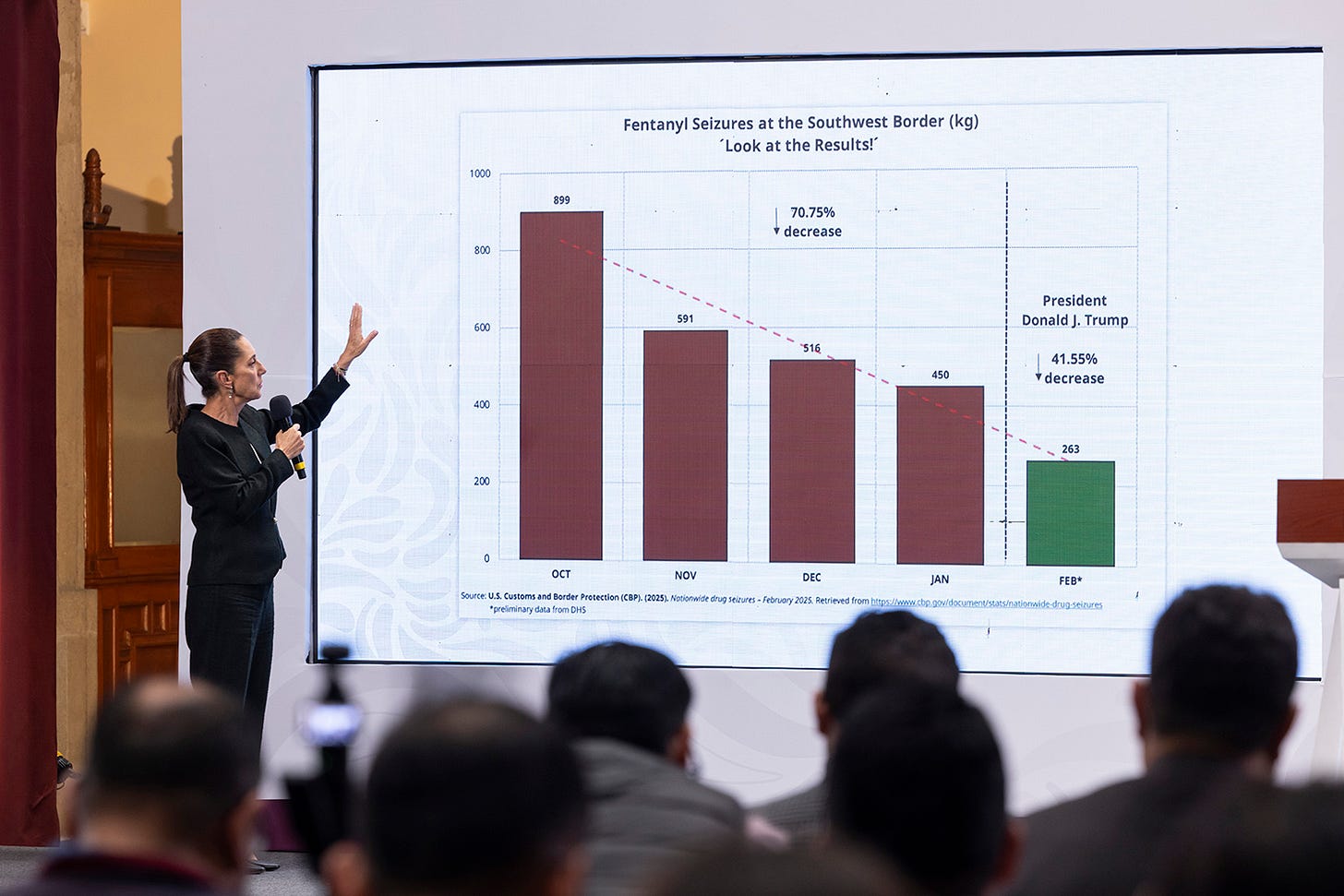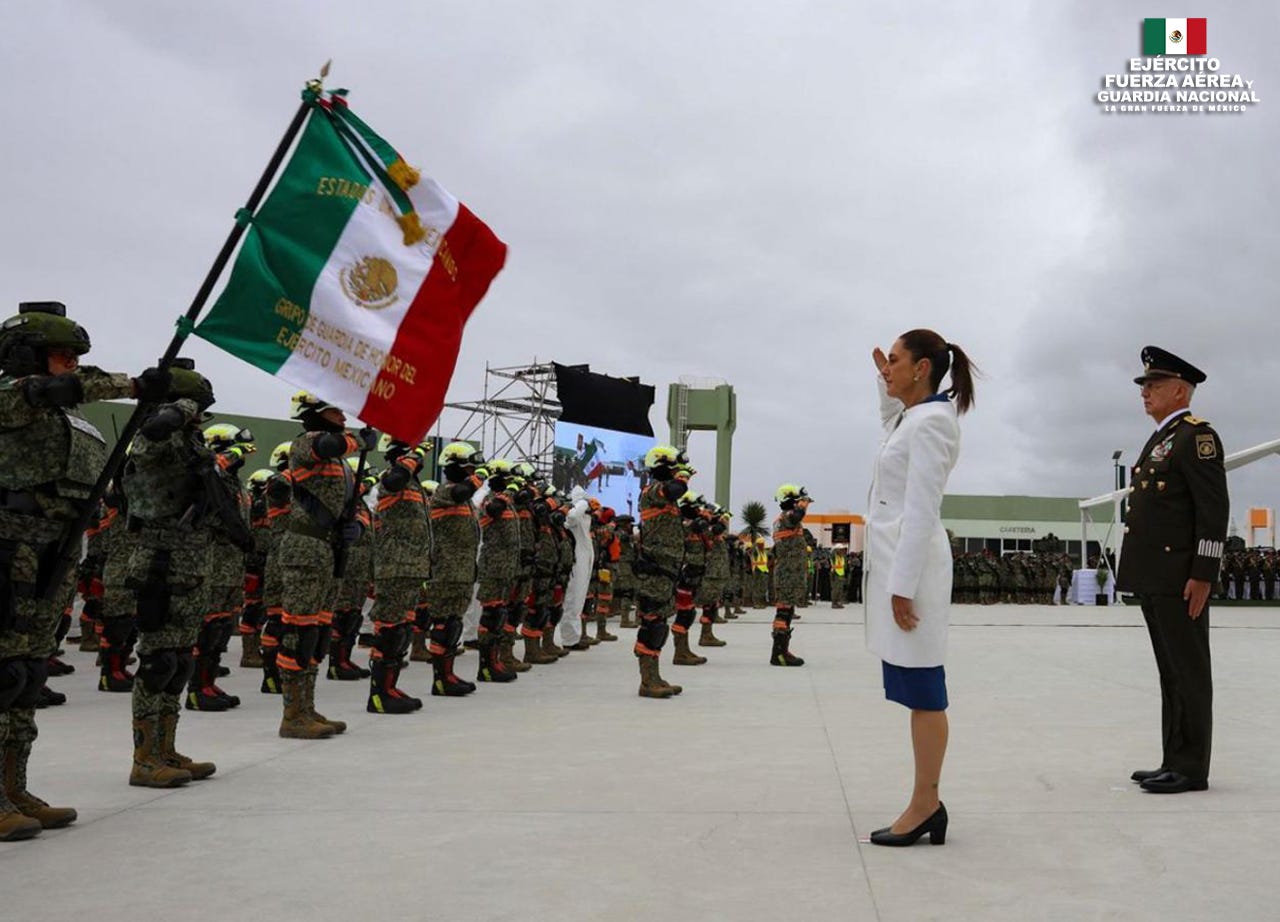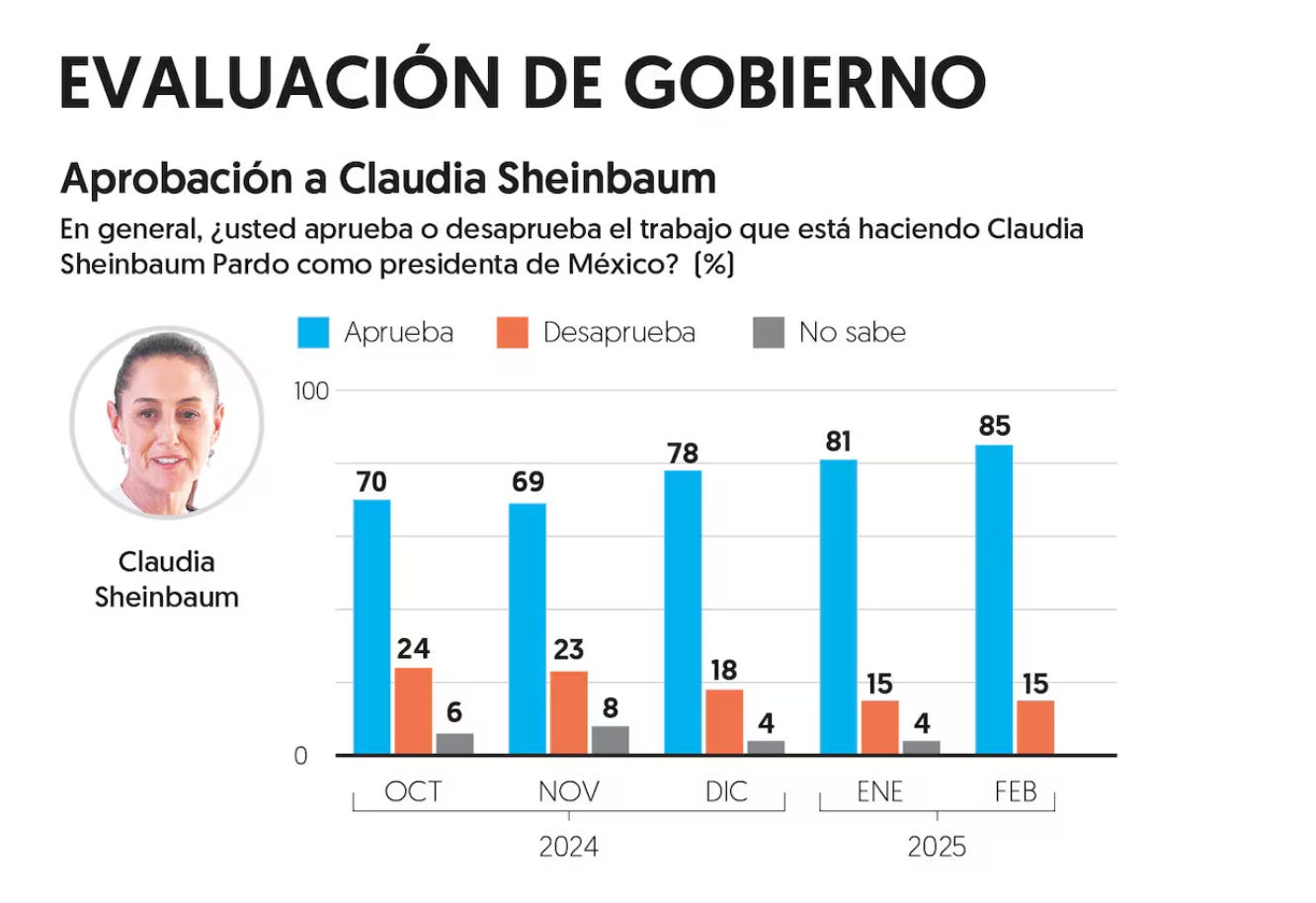Trump, Sheinbaum find common ground in populist politics
AMLO and Trump practiced eerily similar populist politics. Is Sheinbaum benefitting from their unlikely relationship?

Mexico received another tariff reprieve Thursday – the second in as many months after President Claudia Sheinbaum spoke with her US counterpart earlier in the day.
In announcing the agreement at her daily press conference – delayed by nearly four hours for a phone call with US President Donald Trump – Sheinbaum mentioned the productive relationship between Trump and her predecessor, former president Andrés Manuel López Obrador. She credited that relationship for reaching an agreement with Trump, saying at her Thursday press conference:
“I also believe – I want to say this – the good relationship that President Trump had with President López Obrador … it was always a relationship of great respect. Remember the president always said: ‘Amigo, presidente.’”
She then shared an anecdote from when Twitter (now X) suspended Trump’s account after the Jan. 6, 2021, storming of the Capitol. AMLO criticized Twitter’s decision, framing it as an issue of censorship. She stated:
“Of the few people in the world who said that it is wrong, because it is wrong in every sense, the censorship, was president López Obrador. … ‘Do you remember?’ President Trump said that.
“So all of this influences the good relationship because he knows, obviously, that we are part of the same movement and that we have always referred to him with respect.”
Groundhog day
The leadup to the tariffs reprieve mirrored the first reprieve in February, though Trump had already slapped tariffs on Canada and Mexico two days earlier.
Sheinbaum delayed her morning press conference Thursday to have a phone call with Trump – just like she did prior to the first reprieve. She emerged afterward to a triumphant tweet, announcing another pause on tariffs for items meeting USMCA requirements.
Trump posted a similar message on social media, outlining the agreement. He brokered the deal “out of respect for President Sheinbaum,” who he has spoken fondly of – unlike his Canadian counterpart, outgoing Prime Minister Justin Trudeau. (Canada got a reprieve, too, after hours more of waiting.)
“Our relationship has been a very good one, and we are working hard, together, on the Border, both in terms of stopping Illegal Aliens from entering the United States and, likewise, stopping Fentanyl,” Trump said on Truth Social.
The agreement once again showed Sheinbaum’s deft skill in managing Trump, even after the White House accused the Mexican government of having an “intolerable alliance” with drug cartels. She maintained her firm, sober and somewhat dry communications with the country, talking back at Trump without antagonizing him, raising Mexican frictions over issues such as guns coming into the country and promising dialogue.
At the same time, she quietly agreed to US demands, especially on security matters.
In comparison to Canada
Trudeau, in comparison, announced retaliatory tariffs. Canadian provinces unveiled measures such as pulling US booze from government liquor stores and putting surcharges on power going to the United States. Canadians express exasperation with talk of annexation, prompting buy-Canadian campaigns and the cancelling of US travel plans. Trudeau summed up the frustrations with the sharp comments:
“What (Trump) wants is to see a total collapse of the Canadian economy, because that will make it easier to annex us.”
Trudeau leaves office Sunday, when the ruling Liberal Party picks a new leader. Ironically, Trump rescued the Liberals, who trailed the Conservative Party by 25 points in January, but roared back to competitiveness as the next election became a question on who can best confront the US leader.
Mexican cooperation
Sheinbaum, in comparison, speaks of sovereignty ad nauseam. But she ultimately cooperates and avoids criticizing Trump. (Trudeau calls Trump by his first name, though the latter calls the former “governor.”)
Mexico sent 10,000 soldiers to the northern border, ostensibly to stop drugs, especially fentanyl.
She showed numbers on Thursday to demonstrate cooperation with the United States: dramatically less fentanyl crossing the border – after AMLO, her predecessor, famously insisted fentanyl wasn’t made in Mexico. (Recall then-public security and citizen safety secretary Rosa Icela Rodríguez telling visiting US officials in 2023: “Mexico is not a producer of fentanyl, it is a transit country.”)
Migration through Mexico has collapsed. US Customs and Border Protection (CBP) had 8,239 migrant encounters in February – the lowest monthly total on record. “US shelters are kind of in a hibernation mode. … Mexican shelters are also dwindling in population,” a Jesuit priest working with migrants in Tamaulipas told this newsletter.
Mexican immigration officials and the national guard also continue detaining and returning migrants to its southern states on the border with Guatemala, where some can be repatriated to Central America. Many remain stuck. however. The US is also deporting Mexican migrants to southern cities such as Tapachula, sources say, to “make it really hard for them to come north through Mexico.”
Sheinbaum boasted of the enforcement:
“We will continue to work together, particularly on migration and security issues, including the reduction of fentanyl illegally crossing into the United States, along with weapons into Mexico.”
‘Wonderful woman’
For his part, Trump spoke effusively of his Mexican counterpart when signing the orders for pausing tariffs. He said:
“I spoke with the president of Mexico, wonderful woman today, and we helped them out with a problem they were having, having to do with the tariffs, short-term tariffs. And we had a very good conversation. Also we discussed drugs, they’ve been working much harder lately, do you notice that on people coming in and drugs? And we’ve made tremendous progress on both.”
Vice President J.D. Vance was asked about Mexico, too, on Thursday, when a journalist wondered if US intervention was possible. “No,” Vance responded tersely.
Trump’s public esteem for Sheinbaum contrasts sharply with his scorn for Trudeau. He belittles the Canadian leader as “governor,” while referring to Canada as the 51st state and openly threatening annexation.
“Despite the terrible job he's done for Canada, I think that Justin Trudeau is using the Tariff problem, which he has largely caused, in order to run again for Prime Minister. So much fun to watch!,” Trump said on Truth Social.
85 per cent approval rating
Sheinbaum enjoys an approval rating of 85 per cent, in comparison, while the opposition is moribund. Like Canada’s Liberal Party, she’s used Trump for domestic political purposes. She scheduled a rally for Sunday in the Zócalo, where she was to announce her response to Trump.
She used the upcoming event – a populist staple for her predecessor, but also a tactic from PRI presidents of past decades – to portray the opposition as unpatriotic for not potentially attending. She also used it to project strength from the Zócalo, the seat of power in Mexico since pre-colonial times.
“It’s something done as a show of political muscle,” said Fernando Dworak, a political analyst. “We have a rhetoric, a use of images from long ago, of these large concentrations [of people] as spontaneous manifestations of national unity. It’s an old use of an old political symbolism.”
Bonding over populism
The Mexican president is sometimes portrayed more of a technocrat than a populist due to her scientific background. But, unlike Trudeau, the poster child of a declining cosmopolitan political class, Sheinbaum rose through AMLO’s populist political movement. She borrows from his populist tropes, too – starting with the morning press conference, which she christened, “mañanera del pueblo.”
AMLO, of course, famously got along with Trump – two populists with a similar style of politics. As this author wrote in 2021, when AMLO commiserated with Trump over the latter’s allegations of election fraud, which sounded oddly similar to AMLO’s baseless claims of the 2006 election being rigged:
“The presidents also speak of being persecuted, distrust bureaucracies and undermine institutions. They both deal in conspiracies, deeply dislike the media and have preferred to play down the pandemic.”
AMLO waited more than a month to congratulate former president Joe Biden, saying he wanted all legal issues to be resolved (though he was quick to recognize victories of leaders he considered fellow travellers.) He was among the last world leaders to do so, sending the U.S. president-elect a terse letter – unlike the seven-page document he sent Trump in July 2018 – which warned:
“We have the certainty with you in the presidency it will be possible to continue applying the basic principles of foreign policy established in our constitution; especially that of non-intervention.”
Sheinbaum has agreed to re-establish security cooperation with the United States. Drones and spy planes fly over US territory. Mexico handed over 29 drug cartel bosses to the United States after years of reticence on the issue. Mexico is stopping migrants in record numbers (something that started under AMLO).
Canada to confront Trump with a technocrat
Canada’s Liberals appear ready to replace Trudeau with a technocratic leader (who becomes prime minister) in former Bank of Canada and Bank of England governor Mark Carney – rather than confrontational Conservative leader Pierre Poilievre. Polls show Canadians seeing Carney as better able to confront Trump. For his part, Trump showed little enthusiasm for Poilievre, telling The Spectator, “He’s not a Trump guy.”
Populists finding common cause?
Mexico, in comparison to Canada, elected a president running on a platform of continuing the so-called “fourth transformation,” a popular and populist political project. AMLO found common ground with Trump in populist politics. Sheinbaum appears to be doing the same. It may ultimately spare the country the worst of Trump’s wrath.








